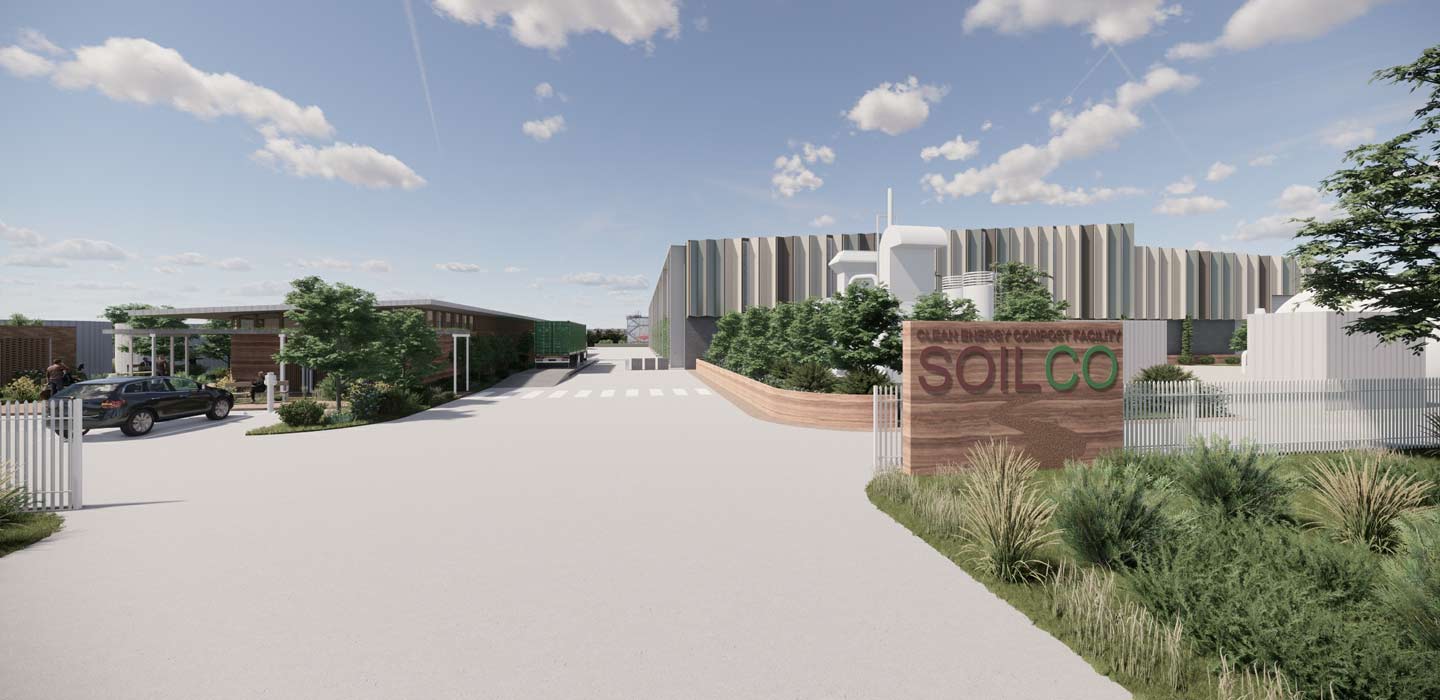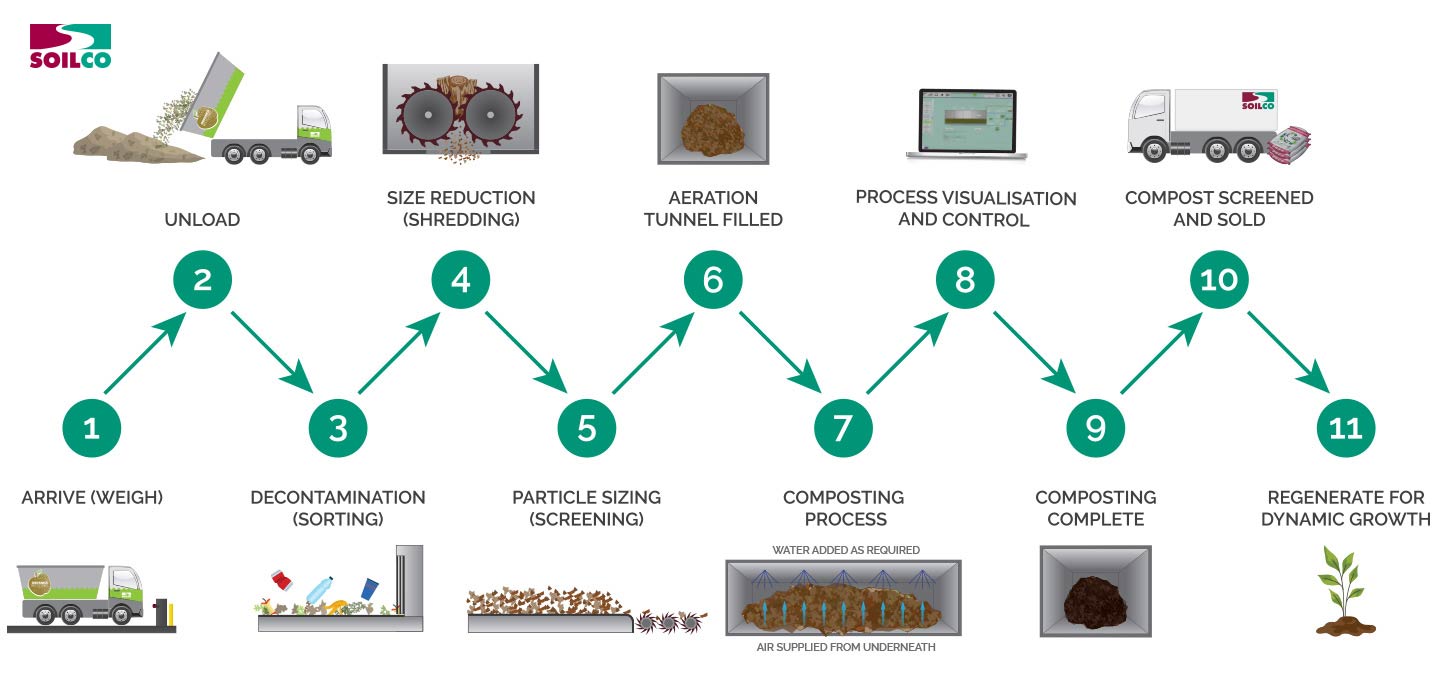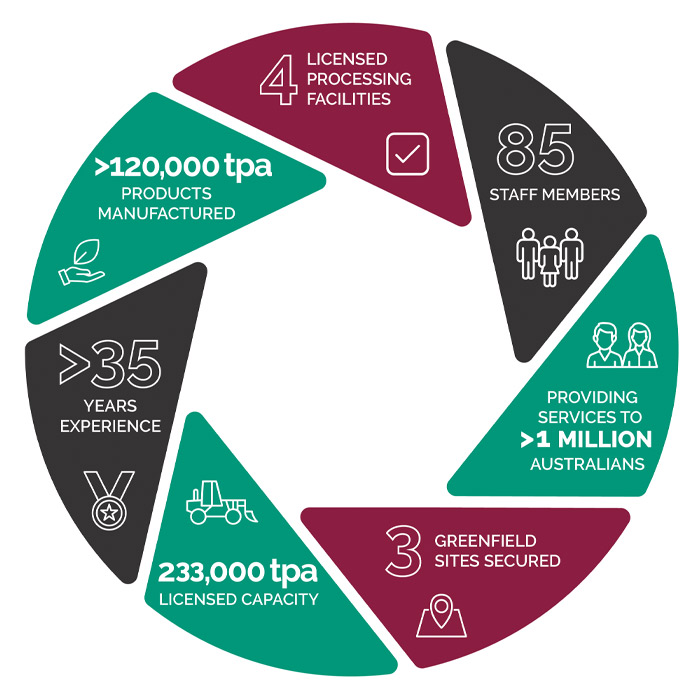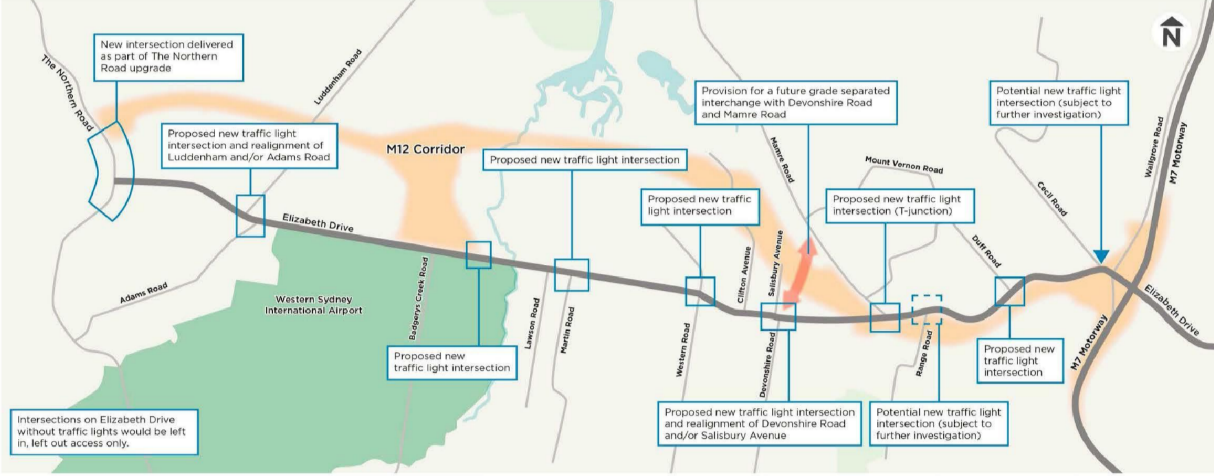
Proposal
The proposed Sydney Clean Energy Compost Manufacturing Facility (SCECMF) is a fully enclosed organics processing facility.
Food and garden organics (FOGO) is organic waste generated in gardens and kitchens. At the SCECMF it will be recycled into quality assured compost products that can be used in home gardens, on public green spaces and on agricultural land.

Processing, composting and storage of all organics will be conducted indoors in 16 enclosed concrete tunnels. The facility will operate under negative pressure and will have automatic high-speed doors to enable vehicles to enter and exit the facility quickly and efficiently.
An amount of FOGO will also be used to generate onsite renewable energy, through anaerobic digestion, to operate the plant, creating a net zero energy.
The proposed SCECMF will be designed, constructed and operated as an industry leading composting facility, offering state of the art sustainable organics recycling.
To guide the development of the site, an ambitious Sustainability Strategy & Vision, which incorporates the project’s Connecting with Country Strategy, has been developed for the project.
Following six months of planning, the design for the proposed Sydney Clean Energy Compost Manufacturing Facility has been updated to reflect ongoing environmental study outcomes and feedback from stakeholders.
Proposed hours of operation
Waste receipts and processing
Mon-Fri: 5am-10pm
Sat, Sun and Public Holidays: 6am-4pm
Operation of In Vessel Composting tunnels, anaerobic digestor and onsite generation equipment
24 hours per day, 7 days a week
Sustainability Strategy
The Project has an ambitious vision; to be the most sustainable, advanced composting facility in the world. A Sustainability Strategy has been developed for the project based on reviews of global and local context, global megatrends, and project benchmarks with key drivers of change including:
- Decarbonisation to eliminate fossil fuels, and,
- Design resilience for a changing climate to cope with water scarcity, extreme weather, and increased peak and average temperatures.
The Strategy has been developed in alignment with the UN Sustainable Development Goals with a focus on 5 key themes:
- Climate Action
- Circularity
- People
- Biodiversity
- Resilience
Targets have been set and specific initiatives will be developed to achieve each of these targets. Design decisions will target circular economy outcomes, while engaging industry, institutions and the local community.
Anaerobic digestion technology and rooftop solar will produce onsite energy. Collecting rainwater and stormwater on-site will reduce the need for mains water. The facility will be designed to cope with periods of water scarcity, extreme weather and increased peak average temperatures, creating a resilient facility well into the future.
The SOILCO Clean Energy Compost Manufacturing Facility will engage with the local community and deliver jobs and skills development in Western Sydney.
Designing with Country
Designing with Country is a process of design collaboration with local Cultural Knowledge Holders and Aboriginal designers to interpret Country and give voice to Country’s history, story and aspirations. It explores the ways in which we can live in Country, supporting the systems with a culture of care and reciprocity. Designing with Country initiatives being explored include:
- Opportunities for cultural access to water,
- Educational partnerships,
- Bush regeneration and Cumberland Woodland plant palette,
- Landscaped water management,
- A responsible approach to material selection
- Materials and colours drawn from local landscape,
- Rapid habitat creation
Onsite Energy Regeneration
A Net Zero carbon strategy is being developed and includes a target of generating 100% of the facility power needs onsite.
Up to 40,000 tpa of organic waste will be sent through the Anaerobic Digestor to produce renewable biogas. This biogas will then be utilised to produce most of the required energy required to run the composting facility. This biogas system will run 24 hours a day and provide reliable base power for the facility.
The balance of the facility power needed to run daytime operational equipment will come from an extensive roof top PV array.
Proposed Timing
Proposed construction to commence in late 2023 with operations commencing 2025.
Environment
Site
SOILCO’s proposed SCECMF facility is located at 30-40 Martin Road, Badgerys Creek, NSW. The site is zoned ENT (Enterprise Zone) and ENZ (Environment and Recreation) under the SEPP WPC. A Waste or Resource Management Facility is permissible with consent.
The surrounding land is a mix of SP2 Infrastructure and ENT zoned land to the North, South and West, with some rural residential properties to the east beyond Wianamatta South Creek.
The total site is 4.5 hectares.
The proposed facility is 1.8 hectares.
Capacity
Receipt, sorting and composting of garden, food and wood wastes up to 190,000tpa – including Anaerobic Digestion of up to 40,000tpa of organic wastes.
Import of up to 30,000tpa of sand and soils to supplement composted products
Air quality and odour management
The facility will operate under negative pressure with all exhaust air controlled and treated within the onsite odour management system. The system will contain specialist equipment for management of odours in line with local and state regulations.
SOILCO has engaged and will continue to work with specialist consultants who have recommended measures to evaluate and mitigate air quality/odour associated with the construction and operation of the facility.
Water management
The facility will minimise water consumption through the use of the three R’s: Reduce, Reuse, Recycle. Potable (Towns) water will be nearly eliminated from normal operational use with only a few small exceptions for items like drinking water.
All process water (clean) will be Re-used through onsite Rainwater and Stormwater harvesting systems.
All leachate (dirty) generated by the facility will be collected, stored and Recycled back into the composting process as process water.
Noise management
Appropriate noise controls and procedures will be developed including housing most equipment indoors, selecting appropriate equipment and managing noise with suitable enclosures and insulators. These actions will ensure both the night-time criteria and sleep arousal criteria are satisfied.
Specialist consultants have been engaged to prepare a Noise Impact Assessment. This includes a model of all noise sources to ensure the facility meets the NSW Environmental Protection Authority Noise Policy for Industry (NPI).
Aviation
Given the site’s proximity to the Western Sydney Airport (WSA), SOILCO has engaged an aviation impact specialist to ensure the facility will not impact on any aviation activity. Discussions are underway with WSA and the Commonwealth Department of Infrastructure, Transport, Regional Development and Communications to ensure all requirements are suitably met.
Traffic
The Site is accessed directly off Martin Road via Elizabeth Drive with setback allowance being provided for anticipated future widening. Two access points are planned; one for incoming traffic and a separate one for outgoing traffic. A Sustainable Travel Plan is being developed to accompany the EIS in line with the requirements of Liverpool City Council.
A quantitative traffic impact assessment for the proposed site will be prepared in accordance with relevant Roads and Maritime Services and Austroads guidelines. Traffic movements will be restricted to Elizabeth Drive and Martin Road. Elizabeth Drive is a major arterial road and east-west corridor.
Transport for NSW is proposing to upgrade Elizabeth Drive between the M7 Motorway and The Northern Road from a two-lane road to a four-lane road (two lanes in each direction) and may also be widened to six lanes in the future.
Flora and fauna
An assessment of the proposal’s biodiversity impacts will be undertaken in accordance with the Biodiversity Conservation Act 2016, including the preparation of a Biodiversity Development Assessment Report.
Studies to date show the footprint of the proposed facility will not impact any critical vegetation species. Any trees removed to build the facility will be addressed within the landscape design which will include planting of species approved within the Aerotropolis while maintaining a Connection to Country.
Community and Education
Onsite Education
The purpose-built education space is an integral part of the design of the facility. It is proposed to provide regular and ongoing educational opportunities to assist community, school and industry groups to better understand what happens to the contents of their local green bins, the impacts of contamination and to see the circular economy in action.
Site Tours and Open Days
Guided tours will give the community first-hand opportunities to see the transforming of FOGO into a valuable product. Tours will include the site’s unique Indigenous Connection to Country. Various Open Days will be offered at the facility throughout the year.
What is FOGO?
Food Organics, Garden Organics (FOGO) is organic waste generated in our gardens and kitchens. It includes food scraps such as spoilt leftovers, coffee grinds, vegetable peelings, meat bones and general garden waste including grass clippings and weeds.
When processed by a licensed facility, FOGO becomes a valuable commodity, full of energy and nutrients. It can be recycled into quality assured compost products that comply with Australian standards that can be used in home gardens, on public green spaces and on agricultural land.
According to the NSW Waste and Sustainable Material Strategy 2041, NSW generates approximately one-third of Australia’s total waste. In FY2019, an estimated 2.5 million tonnes of organic waste (such as food organics, garden organics, timber and textiles) was sent to landfill.
At current generation and recycling rates, the landfills that service Greater Sydney, and accept household waste, are likely to reach capacity within the next 15 years. Currently forty-three out of 128 Local Government Areas in NSW have FOGO.
‘To help achieve our targets of halving food waste to landfill and achieving net zero emissions from organics in landfill by 2030, we will require the separate collection of food and garden organics from all NSW households by 2030 and food waste from targeted businesses and other entities that generate the highest volumes of food waste, including large supermarkets and hospitality businesses by 2025.’
Department of Planning, Industry and Environment | NSW Waste and Sustainable Materials Strategy 2041
As these FOGO and FO policies are implemented, NSW will require more than one million tonnes of organics infrastructure to be in place by 2030.
Who is SOILCO?
SOILCO is an industry leader in organics recycling with over 35 years of experience producing quality assured soil, compost and mulch products. SOILCO was founded in 1974 and has strong ties to the agricultural sector. Since then, the company has grown and diversified operations to meet the challenges of Australia’s dynamic waste and resource recovery sector.
As a pioneer in manufacturing sustainable soil health products, SOILCO has worked with both industry and government to set the benchmark for quality assured recycled organic products. SOILCO enables the circular economy by diverting valuable food, garden and wood waste away from landfills to our licensed organics processing facilities throughout New South Wales.
SOILCO continues to evolve to meet the ever-changing operational and regulatory requirements of the unique organics industry. SOILCO now specialises in the design, build and operation of innovative organics recycling facilities that convert organic waste into quality-assured products.

Where to from here?
The Sydney Clean Energy Compost Manufacturing Facility is a State Significant Development proposed within the new Western Parkland City.
An Environmental Impact Statement (EIS) is required under the Environmental Planning and Assessment Act 1979 as part of the Development Application process. The EIS describes the proposed facility and provides an assessment of potential environmental and social impacts and benefits of the project.
The EIS includes detailed specialist studies such as noise, air quality, biodiversity, surface water and transport impacts. During the preparation of these studies, SOILCO continues to consult with the relevant statutory authorities to ensure that the design, construction and operation activities associated with the proposed facility are environmentally sound.
The EIS will be lodged with the NSW Department of Planning, Industry and Environment and placed on public exhibition in due course. The EIS process includes the studies and consultation undertaken, the public exhibition of the EIS document, and the incorporation of public comments.
Community concerns identified during the consultation process will be considered and addressed as part of this assessment. To provide feedback on the proposal, please click here.
Frequently Asked Questions
What is the proposed Sydney Clean Energy Compost Manufacturing Facility?
The proposed Sydney Clean Energy Compost Manufacturing Facility (SCECMF) is a fully enclosed organics processing facility.
Food and garden organics (FOGO) is organic waste generated in gardens and kitchens. At the SCECMF it will be recycled into quality assured compost products that can be used in home gardens, on public green spaces and on agricultural land.
Processing, composting and storage of all organics will be conducted indoors using 16 enclosed concrete tunnels. The facility will operate under negative pressure and will have automatic high-speed doors to enable vehicles to enter and exit quickly and efficiently.
An amount of FOGO will also be used to generate onsite renewable energy, through anaerobic digestion, to operate the plant, creating a net zero energy.
Where will it be?
The proposed site is 30-40 Martins Road Badgerys Creek.
The site is zoned ENT (Enterprise Zone) and ENZ (Environment and Recreation) und the State Environmental Planning Policy Western Parklands City (SEPP WPC).
The site is 4.5 hectares. The proposed facility is 1.8 hectares.
When will construction/operation commence?
Proposed construction to commence in late 2023 and operations in late 2025.
How will it work?
The facility will receive, sort and compost up to 190,000 tonnes of garden, food and wood wastes per annum. It will be recycled into quality assured compost products that comply with Australian standards and can be used in home gardens, on public green spaces and on agricultural land.
The capacity includes 40,000tonnes per annum of organic waste for anaerobic digestion to produce renewable biogas, used to create onsite renewable energy. The biogas system will operate 24 hours a day providing reliable power for the facility.
Up to 30,000 tonnes per annum of sand and soils will be brough on site to supplement composted products.
Why is it required?
By 2030 all households in NSW will have access to a Food Organics and Garden Organics (FOGO) service – the green bin. Commercial Food Organics will also be required to be diverted from landfill by 2025.
To enable this to happen, the NSW Government has identified the need for new processing infrastructure across the state.
What are the proposed hours of operation?
Waste receipts and processing
Mon-Fri: 5am-10pm
Sat, Sun and Public Holidays: 6am-4pm
Operation of In Vessel Composting tunnels, anaerobic digestor and onsite generation equipment
24 hours per day, 7 days a week
What is the approval process?
An Environmental Impact Statement (EIS) is required under the Environmental Planning and Assessment Act 1979 as part of the Development Application process. The EIS describes the proposed facility and provides an assessment of potential environmental and social impacts and benefits of the project.
The EIS includes detailed specialist studies such as noise, air quality, biodiversity, surface water and transport impacts. During the preparation of these studies, SOILCO continues to consult with the relevant statutory authorities to ensure that the design, construction and operation activities associated with the proposed facility are environmentally sound.
The EIS will be lodged with the NSW Department of Planning, Industry and Environment and placed on public exhibition in due course.
Community concerns and comments are welcomed and will be addressed as part of the Environmental Impact Statement.
What about air quality and odour?
The facility will operate under negative pressure with all exhaust air being managed within an onsite odour control system. The system will contain specialist equipment for management of odours in line with local and state regulations.
SOILCO has engaged and will continue to work with specialist consultants who have recommended measures to evaluate and mitigate air quality/odour associated with the construction and operation of the facility.
What about water management?
The facility will minimise water consumption by reducing, reusing and recycling. Potable (towns) water will be nearly eliminated from normal operational use with only a few exceptions for items like drinking water.
All process (clean) water will be re-used through onsite rainwater and stormwater harvesting systems.
All leachate (dirty) generated by the facility will be collected, stored and recycled back into the composting process as process water.
What about noise?
Appropriate noise controls and procedures are being developed including housing most equipment indoors and selecting appropriate equipment and managing noise with suitable enclosures and insulators. These actions will ensure both the night-time criteria and sleep arousal criteria are satisfied and maintained.
Specialist consultants have been engaged to prepare a Noise Impact Assessment. This includes a model of all noise sources to ensure the facility meets the NSW Environmental Protection Authority Noise Policy for Industry (NPI).
Will the site be near the new airport?
Given the site’s proximity to the Western Sydney Airport (WSA), SOILCO has engaged an aviation impact specialist to ensure the facility will not impact on any aviation activity.
Discussions have been underway for some time with WSA and the Commonwealth Department of Infrastructure, Transport, Regional Development and Communications to ensure all requirements are suitably met.
What about traffic?
The site is accessed directly off Martin Road via Elizabeth Drive with setback allowances being provided for anticipated future widening. Two access points are planned: one for incoming traffic and a separate one for outgoing traffic. A Sustainable Travel Plan is being developed to accompany the EIS in line with the requirements of Liverpool City Council.
A quantitative traffic impact assessment for the proposed site will be prepared in accordance with relevant Roads and Maritime Services and Austroads guidelines. Traffic movements will be restricted to Elizabeth Drive and Martin Road. Elizabeth Drive is a major arterial road and east-west corridor.
Transport for NSW is proposing to upgrade Elizabeth Drive between the M7 Motorway and The Northern Road from a two-lane road to a four-lane road (two lanes in each direction) and may also be widened to six lanes in the future.
What about the natural environment?
Studies show the footprint of the proposed facility will not impact any critical vegetation species. Any trees removed to build the facility will be addressed within the landscape design which will include planting of species approved within the Aerotropolis while maintaining a Connection to Country.
An assessment of the proposal’s biodiversity impacts is being undertaken in accordance with the Biodiversity Conservation Act 2016, this includes the preparation of a Biodiversity Development Assessment Report.
What is connection to country?
Connection to country is a process of design collaboration with local cultural knowledge holders and Aboriginal designers to interpret Country and give voice to country’s history, story and aspirations.
It explores the ways in which we can support a culture of care and reciprocity. Connection to country initiatives being explored include:
- Opportunities for cultural access to water,
- Educational partnerships,
- Bush regeneration and Cumberland Woodland plant palette,
- Landscaped water management,
- A responsible approach to material selection,
- Materials and colours drawn from local landscape, and,
- Rapid habitat creation
What is anaerobic digestion?
Anaerobic digestion of garden and food waste to produce biogas for onsite power generation.
Will there be community education facilities?
A purpose-built education space is an integral part of the design of the facility. It is proposed to provide regular ongoing education opportunities for community, school and industry groups to better understand what happens to their local green bin, the impacts of contamination and to see the circular economy in action.
Guided tours will show the community first-hand how the raw resource of FOGO is transformed into a valuable product Tour will include learning about the site’s Indigenous connection to country. Various Open Days will be offered at the facility throughout the year.
How can I find out more?
You can find out more by visiting the following links:
- Planning Secretary’s Environmental Assessment Requirements (for Sydney Clean Energy Compost Manufacturing Facility) Issued 24/06/2022 Section 4.12(8) of the Environmental Planning and Assessment Act 1979 Part 8, Division 5 of the Environmental Planning and Assessment Regulation 2021
- NSW Planning Portal status of the project
